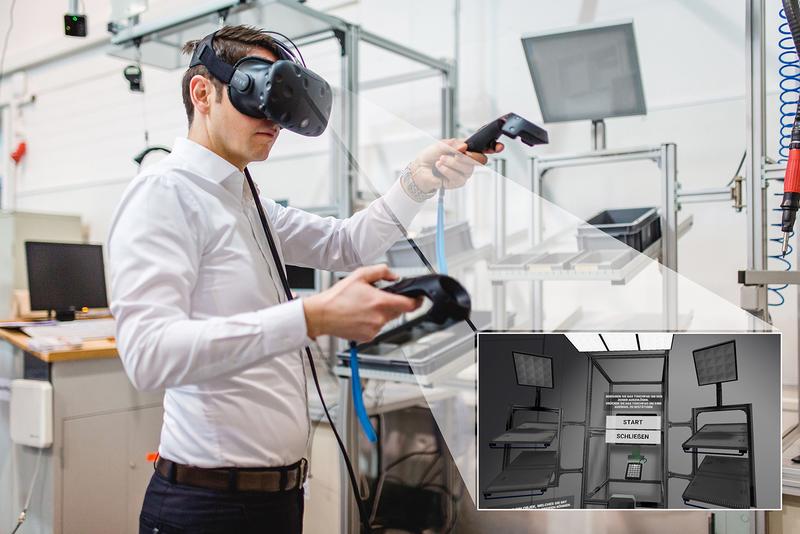
Enhancing Knowledge Transfer with Digital Twins in Manufacturing

Future Work Lab: augmented and virtual reality applications enable cost-effective planning and a faster way to adapt production systems in the event of disruptions on the shop floor.
© Fraunhofer IAO/Ludmilla Parsyak
The concept of a digital twin is widely accepted in modern manufacturing and represents a key component of Industrie 4.0. It provides a digital model of the entire production process and a means of intervening directly in production at any time.
Put simply, a digital twin is a digital representation of a real object in the digital world. Researchers at Fraunhofer IAO and Fraunhofer IPA are now taking this concept even further by applying it to the field of knowledge transfer. Anyone interested in the latest research and innovative solutions offered by Fraunhofer IAO and Fraunhofer IPA can find information they need and check out innovative new methods on site.
Now, scientists working on the “FutureWork360” project are creating digital twins of their lab environments using a laser scanner. By bringing these labs into the digital realm, they can make them available online. Visualization of these digital twins is handled by the technology partner Hemminger Ingenieurgesellschaft mbH.
Virtual access to research and innovation
“The 360-degree scanner captures our laboratories and makes them available online so that people can access them from anywhere and at any time”, says IAO researcher and project manager Yeama Bangali. Visitors to the website
www.futurework360.de/en.html can take virtual tours of the labs and explore them at their own pace to get an initial idea of what they offer.
The choice of tours currently includes additive manufacturing, assistance systems, digital planning and connected manufacturing systems. Bangali and her team have been offering guided tours since the end of March, and visitors can also attend live Q&A sessions in online meeting rooms.
The scientists’ research is presented through texts, videos and images. Examples include the use of virtual reality to help people experience different forms of human-machine-collaboration. “If a company expresses interest in a specific use case, then we invite them to an online session.
The response to this digital form of interaction in virtual labs has been very positive – we observed that particularly clearly in the webinars we had organized with members of Plastipolis, an industry and research cluster that promotes the French plastics industry,” says Bangali.
New working models enabling new and climate-friendly ways of working
The aim of the FutureWork360 project, which is funded by the German Federal Ministry of Education and Research (BMBF), is to explore what virtual forms of collaboration might look like in the future.
“Our approach offers excellent potential in times of crisis and beyond. It’s easy to run an Open Lab Day online using our digital platform. We also offer an efficient and climate-friendly working model for international collaboration. Eliminating travel costs is easy if nobody has to fly,” says Bangali. The researcher and her colleagues are currently working on new tools for collaboration and optimizing the digital twin of the Future Work Lab.
https://www.fraunhofer.de/en/press/research-news/2020/july/using-digital-twins-f…












